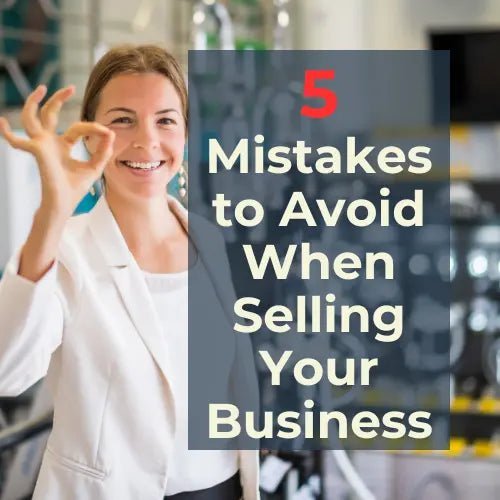
5 Common Mistakes Australian Owners Make When Selling Their Business
Share
Selling your business is one of the most significant financial events of your life. Done well, it can set you up for the next chapter—retirement, a new venture, or more time with family. Done poorly, it can leave you short-changed and full of regret. Australian owners make these common mistakes when selling.
In Australia, thousands of businesses change hands each year, yet a large percentage fail to sell or sell for far less than they should. Having worked with countless business owners preparing for exit, I’ve seen the same five mistakes crop up again and again. Avoid these, and you dramatically improve your outcome.
🎙️ New Episode: How to Increase Your Business Valuation
Discover the levers that actually move your valuation multiple. In this episode of Built to Sell | Built to Buy, Sam breaks down the numbers, the metrics, and the mindset that will boost your business worth—whether you're planning to sell soon or just want to build a more valuable business.
Explore more episodes at sampenny.com/podcast
1. Waiting Too Long to Prepare (The Most Common Mistakes)
Many owners only start thinking about selling when they’re exhausted, burnt out, or facing a personal crisis. By then, it’s often too late to fix what’s broken or demonstrate consistent performance.
Why it hurts value:
- Buyers want stable businesses with predictable earnings.
- Last-minute exits raise red flags around sustainability and leadership succession.
- There’s no time to address operational or financial issues.
What to do instead:
- Start preparing at least 12–24 months in advance.
- Treat your business like it’s for sale even if you’re not selling yet.
- Build systems, delegate roles, and get clean financials in place early.
2. Relying Too Heavily on Themselves
A common scenario: the owner is the rainmaker, operations guru, and glue that holds everything together. When buyers see this, they see risk.
Why it hurts value:
- If the business can’t run without you, it’s not truly saleable.
- Buyers will discount offers or walk away.
- Transition becomes complicated and time-consuming.
What to do instead:
- Build a capable leadership team.
- Document key processes and delegate responsibility.
- Remove yourself from daily operations over time.
3. Overestimating Business Value
Every business owner thinks their company is worth more than the market says it is. Emotional attachment and years of effort cloud objectivity.
Why it hurts value:
- Unrealistic expectations waste time with unqualified buyers.
- Good offers are rejected in pursuit of imaginary numbers.
- Confidence in the sale process erodes.
What to do instead:
- Get a professional valuation based on real market data.
- Understand valuation drivers: EBITDA, risk profile, recurring revenue, etc.
- Benchmark against similar businesses in your sector.
4. Hiding Issues Instead of Addressing Them
Some owners believe if they don’t mention a problem, buyers won’t notice. But in due diligence, everything comes out.
Why it hurts value:
- Surprises kill deals.
- Lack of transparency damages trust.
- Problems discovered late in the process reduce the offer or derail the sale.
What to do instead:
- Identify and fix issues before going to market.
- Be upfront about any challenges, with a plan to resolve them.
- Conduct your own internal due diligence first.
5. Choosing the Wrong Advisors (or Going It Alone)
Too many owners try to save money by doing everything themselves or hiring professionals who aren’t experienced in business sales.
Why it hurts value:
- Missed opportunities to position the business strategically.
- Poor negotiation can cost hundreds of thousands.
- Legal and financial errors can delay or kill deals.
What to do instead:
- Work with a team of experienced advisors: accountant, lawyer, business coach, and M&A expert.
- Get advice early, not when it’s urgent.
- Invest in professional help that delivers ROI.
Final Thoughts
Selling your business is not just a transaction—it’s a process. One that requires forethought, preparation, and the right team around you.
Avoiding these five mistakes won’t just save you headaches—it can add hundreds of thousands, if not millions, to your final sale price.
Whether you’re considering selling in the next 6 months or 5 years, now is the time to get clear. If you’d like a free strategy call to assess your readiness and identify any blind spots, book a call with Sam Penny today.
Download the Business Sale Readiness Checklist
Avoid common pitfalls and prepare your business like a pro. Grab your free checklist to ensure you’re not leaving money on the table.
Related Reads
- Top 5 Mistakes Investors Make When Buying a Business for Sale in Australia
- Exit Planning for Business Owners: The Complete Guide to a Profitable and Stress-Free Business Exit
- Customer Feedback is Gold! How to make your food product even better
- Discomfort Debt: The Hidden Cost of Every Brave Move You Don’t Make
- How to Make Yourself Redundant: The Blueprint for Owner Independence with Nigel Hall


